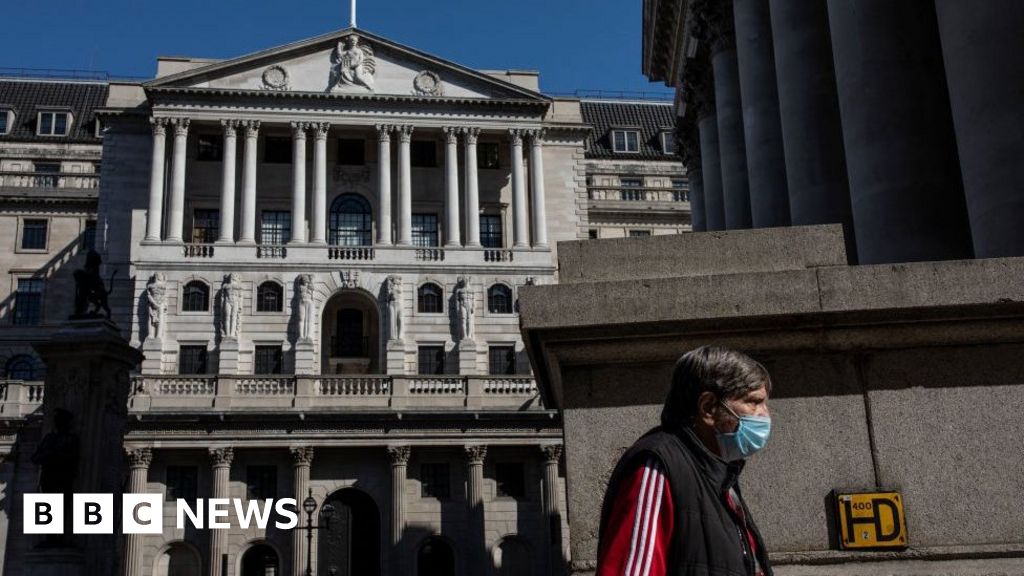
The Bank of England has warned that the rising rate of coronavirus infections and a lack of clarity over the UK's future trade relationship with the EU could threaten the economic recovery.
It said much of output lost during lockdown had been recovered but the outlook remained "unusually uncertain".
The UK is still in a deep recession, while Covid-19 infections are at their highest level since mid May.
Citing the uncertainty, the Bank held interest rates at 0.1%, a historic low.
It added that it would continue its monetary support for the economy, but stopped short of increasing its bond-buying programme or reducing interest rates further.
What are interest rates?
If you borrow money you usually have to pay a small fee set by the person lending to you. How high that fee - or interest rate - is depends on a "base rate" that is set by the Bank of England at meetings throughout the year.
The rate determines how much banks have to pay to borrow money, and that has a knock-on effect on how much the bank charges consumers to borrow.
When the economy is growing quickly the Bank tries to stop it overheating by raising interest rates, making it more expensive to borrow.
When the economy is sluggish, cutting the Bank's base rate lowers the cost of borrowing and can encourage businesses and consumers to spend more.
The Monetary Policy Committee (MPC), which sets interest rate policy, said previous projections of economic recovery were "on the assumption of an immediate, orderly move to a comprehensive free trade agreement with the European Union on 1 January 2021".
Economic recovery would also depend on the evolution of the pandemic and measures taken to protect public health, the MPC said.
"The recent increases in Covid-19 cases in some parts of the world, including the United Kingdom, have the potential to weigh further on economic activity, albeit probably on a lesser scale than seen earlier in the year," it said.
No change from the Bank of England on record low interest rates, nor on its wider support for the economy. On the face of it, the economy is less weak than it expected even last month, but profound uncertainties remain.
The Bank in particular pointed to "recent increases in Covid-19", including in the UK, that "have the potential to weigh further on economic activity", as well as a recent fall in sterling partly "reflecting recent Brexit developments".
Given rates are at rock bottom already, sterling was further hit from the fact that the Bank's deliberations over rates included a presentation over how "negative interest rates" might work.
The Bank had been concerned of the impact of, in effect, lenders paying borrowers for the health of parts of the banking system. It is, as it has previously signalled, looking at how this could be achieved in practice. Should the uncertainties visible to all materialise in the coming weeks for the UK, that extraordinary and unprecedented tool is being prepared as an option.
The government has had to impose new social distancing restrictions across England, as rising cases have forced many areas into local lockdowns.
On Wednesday, the Prime Minister said the government was doing "everything in our power" to prevent another nationwide lockdown, which could have "disastrous" financial consequences for the UK.
Negative rates
The Bank of England said despite a stronger than expected recovery in the last few months, the economy was still about 7% smaller than at the end of last year.
Usually if the economy is not growing strongly enough, the Bank of England considers lowering interest rates to encourage firms to invest and savers to spend.
However, interest rates are already close to zero after two emergency rate cuts in March.
Minutes from this month's meeting show that the MPC discussed the use of negative interest rates to stimulate the economy. Last month, the Bank's governor, Andrew Bailey, appeared to rule that out, though he said negative interest rates remained in the "tool box".
If interest rates are negative the Bank of England charges for any deposits it holds on behalf of the banks. That encourages banks to lend the money to business rather than deposit it.
The Bank also signalled that it had no intention of raising interest rates until "significant progress" had been made in getting inflation back to the Bank's 2% target. It is currently at a five-year low of 0.2%.
The Bank said it did not expect inflation to return to target levels for another two years.
"We expect interest rates to be no higher than 0.1% for the next five years," said Andrew Wishart, UK economist at Capital Economics.
https://news.google.com/__i/rss/rd/articles/CBMiLGh0dHBzOi8vd3d3LmJiYy5jby51ay9uZXdzL2J1c2luZXNzLTU0MTg3NjIx0gEwaHR0cHM6Ly93d3cuYmJjLmNvLnVrL25ld3MvYW1wL2J1c2luZXNzLTU0MTg3NjIx?oc=5
2020-09-17 13:52:30Z
52781067222269
Tidak ada komentar:
Posting Komentar